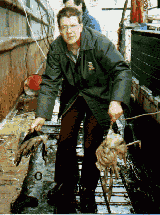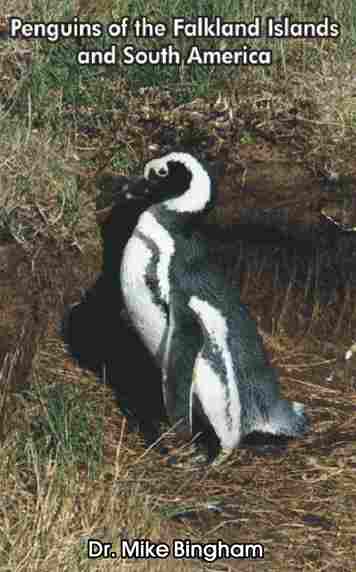 Seabirds killed by oil slick in Stanley Harbour International press reports of our work to save penguins
  by Dr Mike Bingham Electronic download: $3.95 Paperback: $10.95 Proceeds fund our Research Environmental Research Unit, PO Box 434, Stanley, Falkland Islands |
|
Falklands in feud over lost penguinsThe Sunday TimesSunday, 10th October 1999 - by Matthew CampbellMichael Bingham, from Manchester, has been at loggerheads over his field research, linking an alarming decline in penguins to the lucrative commercial fishing of squid. Nobody denies that penguin numbers are falling. The causes, however, are hotly debated. What started as a disagreement among enthusiasts in the obscure realm of penguin research, has turned into an acrimonious affair. Bingham alleges that efforts have been made to hound him off the islands to stop environmental concerns infringing on oil and fishing interests. "It's got quite nasty," said Bingham last week on the telephone from Stanley, the Falklands capital. He complained of anonymous telephone calls, wrongful arrest, a smear campaign, and an attempt to frame him as an importer of illegal pornography. It seems inconceivable that penguins could be at the root of such sinister goings-on in a community of barely 1,600 people, who were liberated from Argentine occupation by the British army and navy in the Falklands war of 1982. Yet Bingham's problems have coincided with a boom in the islands' economy as oil exploration and squid fishing have transformed the agricultural outpost of the 1980s into a more modern, albeit isolated, society. After moving to the islands in 1993, Bingham 41, who had previously been a National Trust warden in the Lake District, began work at Falklands Conservation, a government-funded wildlife charity. As its Conservation Officer, he conducted a survey of penguin nesting grounds in 1995. The results showed the Rockhopper, smallest of the crested penguin species, to be in crisis, having slumped from 3 million pairs at the time of the Falklands war, to just 300,000 pairs. Bingham attributed this to a boom in the fishing of squid, which have become the islands' main source of revenue in the 1990s, as well as the penguins' main source of food. "At first they seemed to be quite happy with the results," said Bingham. But when he carried out a similar survey in South America, revealing that the decline was not a region-wide phenomenon, attitudes began to change. Bingham claims he was told by an oil company director that if he did not keep quiet about the penguins problem, he would lose his job and be kicked off the islands as an undesirable. A few months later, Bingham's job was advertised in the local paper, Penguin News. Falklands Conservation produced rival statistics indicating the number of Rockhoppers was roughly double that counted. Bingham found work at the local power company to fund further research of his own. But an agreement to provide the results to the British Trust for Ornithology was thwarted when Falklands Conservation wrote to the organisation, wrongly accusing Bingham of stealing its data. Then the government notified him that his application for residency permit had been suspended because of the theft charge. Even when Falklands Conservation apologised for its "mistake", the government refused to lift the block on his residency. A few weeks later, Bingham's home was broken into. Bingham claims that he discovered "items of a highly illegal nature" under his bed. He disposed of them, and complained to the Governor that someone was trying to frame him. Customs officers carrying out a "routine mail search" then intercepted a parcel addressed to Bingham containing a pornographic video. Police searched his house. Bingham believes they were looking for the items that had been left under his bed. At this point he began receiving threatening telephone calls, transcripts of which he handed to police. "You're not getting the message, are you?" said one caller in February. "You're still causing trouble. Why don't you leave the Falklands now before you get thrown out?" In March he was arrested and charged with concealing a criminal record. Interpol had apparently provided information to the Falklands government about a Michael Bingham accused of burglary, car theft and affray. It turned out the criminal record related to another Bingham, two years older than him. "Mistakes may have been made," Andrew Gurr, Chief Executive of the Falklands government, acknowledged last week. He said the government was investigating Bingham's claims, but denied it was involved in any effort to intimidate him, or suppress unwelcome news about penguins. This article can also be viewed ONLINE from The Sunday Times archives
A fine mess, StanleyThe GuardianTuesday 12th October 1999 - by John EzardWhen British troops landed on the Falklands in 1982, they took with them from their briefings a decades-old Foreign Office joke. This was that the inhabitants they would mainly meet were 600,000 sheep and 6 million penguins. Mike Bingham's business - and the love of his life - is penguins. That shines out of his written research. He will go down in the history of naturalists as the wildlife researcher who stubbornly blew the whistle and reported evidence of an abominable, still little-known change in and around the Falklands - that the penguin population has crashed to an estimated 1 million. The figures in Bingham's census are now three years old, yet astonishingly they have not previously been revealed in media outside the islands. His statistics have neither been challenged nor disputed. The environmental catastrophe they portray is bad enough. But Bingham, who is 41, has gone much further. He maintains, despite official denial, that the collapse may be linked with another development that has brought an undreamed-of degree of enterprise and prosperity to the islanders. This is the highly successful fishery and conservation zone declared by Britain in the mid-1980s. The theory is that the fishery, even though restricted to quotas, may turn out to be scooping up too many fish and squid that are part of the penguin diet. Something even stranger has happened to Bingham since he compiled his census. He says he too has become an endangered species in the Falklands. He claims he has been the victim of a series of "dirty tricks" aimed at driving him out. This happened after he started campaigning for stricter precautions, as oil exploration - with its possibilities of greater wealth - began recently. Terry Peck - an ex-police chief and senior councillor who won the MBE for helping the SAS in 1982 - said "I have no hesitation in saying he has been disgracefully treated. The whole thing stinks. Nobody is doing anything to help him. If penguins are declining that badly, something should be done quickly." Others agree that this is the factor which stands out in the murk of the dispute. The Falklands are celebrated worldwide for having the world's biggest colonies of rockhopper penguins. Those tiny birds, as they dive from cliffs and stony beaches to bring back food for their fledglings, are one of the most stirring sights in the natural world. Bingham's census says their numbers are 90% down. "The huge breeding colonies that once produced large areas of barren ground, have now been reduced to small clusters of birds huddled in the centre of their stony territories," says his 39,000 word report. The pre-eminent Falklands naturalist, Ian Strange, has also reported an alarming decline in his famous rockhopper colony on New Island. Sealion populations, thought to eat the same fish and squid as rockhoppers, are also heavily down. Now that Bingham's figures have been disclosed, leading international penguin experts will want to check them, and if they prove reliable, think urgently about calling for action. Everything looked so auspicious for wildlife in April 1994, when the charity Falklands Conservation staged a press conference at London Zoo. It launched an appeal for funds to help protect bird habitats, particularly from commercial fishing and from a likely offshore oil industry. "Nature has granted the penguins a relatively trouble-free habitat," said the TV wildlife personality Bill Oddie, "but they face an increasing variety of threats from man." The appeal raised more than £100,000. Down in Stanley, Mike Bingham, a former National Trust warden appointed as the charity's research officer, was ensuring a steady stream of front-page warnings about wildlife threats in the Falklands newspaper, Penguin News. The weekly also printed early results from his census. In December 1996, Bingham was taken to lunch by Lewis Clifton, the charity's recently appointed Falklands chairman (and chairman of Desire Petroleum - one of the companies drilling for oil in the Falklands). Clifton says: "Trustees had decided to structure the organisation on a different footing. There was general concern about the level of publicity oiled birds were getting. There was concern that Bingham was a bit of a loose cannon." But Clifton vehemently denies this was because of concern among oil development companies, as Bingham alleges. Clifton, who was later elected a councillor, also denied that anyone had told Bingham he would be "driven out" unless he quietened down. "I am not God," he said. "I am not in a position to do any of the things he has suggested have been done." Still absorbed by penguins, Bingham decided to continue his research privately and took a £12,000-a-year power station job. Last May the government told him his application for permanent residency had been suspended because an allegation by Falklands Conservation of data theft. Four months later the charge was unconditionally withdrawn, and an apology issued, however Bingham's residency application remains suspended. Last November, Falklands police asked Interpol to check whether Bingham had a criminal record. Interpol sent the record of a man with the same surname but different birthdate and christian name, stressing it needed fingerprints to confirm any link. On March 3, Bingham says, an official visited him at work, saying "This gives us the right to deport you" and showed him a list of UK offences including affray and burglary. Only two days after this embarrassing scene did Falklands police send the fingerprints, which disproved the link. Andrew Gurr's report says "there was nothing to indicate a mistake" on Interpol's list. However a copy of the Interpol list clearly contains the different birthdate. And meanwhile Mary Cawkell, elderly author of Falklands Heritage, a beloved and admired book about the struggles of the early colonists, has written to Penguin News "with mounting horror" about the Bingham affair. "Can this be the Falklands I knew", she asks, most sadly. This article can also be viewed ONLINE from The Guardian archives
|

